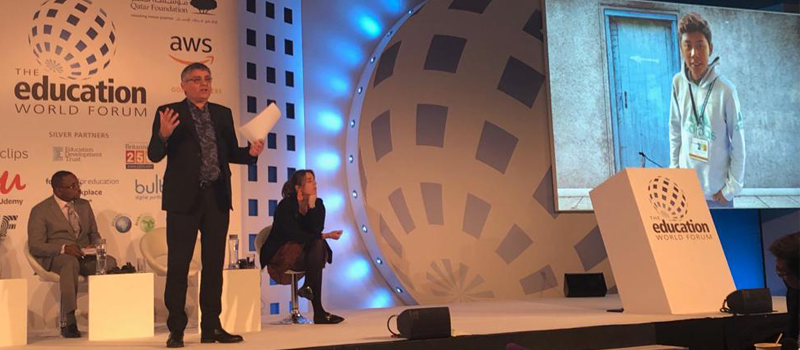21 January 2019

Saul Nassé, Group Chief Executive of Cambridge Assessment, has used a speech to the world’s biggest gathering of education ministers to talk about the power of education to open doors and transform lives.
In his talk at the Education World Forum in London, UK, Saul spoke about how there are three doors that need to be unlocked to open up education opportunities: the teacher, the curriculum and technology.
“As education leaders, we know the transformative power of education,” he said.
“We also know the dangers of leaving the door shut on millions of young lives. When young people get left behind, the world pays the price. But by bringing together the three keys – curriculum, teachers and technology – it should help prevent the door of education from slamming shut on children whatever their circumstances.”
He spoke about how Cambridge has found a way to overcome the challenge of a lack of trained teachers, using a ‘train the trainers’ model which has already proved successful in Kazakhstan.
“If these types of partnerships can be strengthened globally, there is no reason why the world cannot meet the United Nations commitment to deliver primary and secondary school education to every child by 2030 – and open up access to education for millions,” he said.
He then went on to talk about the second ‘key’, curriculum, citing as an example how Fairdale High School in Louisville, Kentucky, USA, chose the Cambridge curriculum through a desire to improve access to higher education and raise standards for all students. Just five years after adopting Cambridge programmes, every single one of Fairdale’s Cambridge students have gone on to further or higher education.
Lastly, Saul addressed the final ‘key’, technology, which he said “should not be in the hands of big corporations but in the hands of learners”. He spoke about Diego Cordova from Guatemala, the youngest recipient of the Internet Society’s 25 under 25 Award. Diego, who has been interested in technology since he first discovered an old tablet at the age of 10, helps out at a local Non-Governmental Organisation called Mundo Posible, taking online educational material to some of the most rural communities in Guatemala.
Saul said that Diego’s example proved that education technology is “not all about expensive iPads or high-speed broadband”.
“Low cost interventions [like this] are democratising and opening up educational content for millions, creating access in the most difficult to reach communities,” he said.
Saul ended his talk by calling on ministers to collaborate to overcome educational inequalities and improve access. “As we walk out the doors of this conference hall, let’s work together,” Saul said. “Work together to unlock the doors. Work together to unleash the potential of the world’s children.”
The theme of this year’s event is What we should do with what we know: Developing education policy for implementation, impact and exponential success and the event runs until Wednesday. This year once again, Cambridge Assessment International Education, Cambridge Assessment English and Cambridge University Press are Platinum Partners for the event under the Cambridge brand.